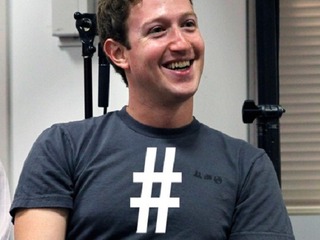DUOS expands AI capabilities to help seniors apply for assistance programs
It will complete and submit forms, and integrate with state benefit systems
Read more...
When Facebook decided to take Twitter head on by introducing hashtags earlier this year, it seemed like a wise move.
Hashtags have, of course, become synonymous with Twitter. They are the way the network is able to bring people together over a common theme or interest. By introducing them, Facebook would be able to do the same thing: make it that much easier for users to see what their friends are doing, what they are thinking about and what they like. Plus, it would take away one of Twitter's biggest brands.
Turns out, though, hashtags might not translate so well onto Facebook. In fact, they actually wind up having a negative effect on posts, at least according to a study by Facebook analytics service EdgeRank Checker put out on Tuesday.
EdgeRank says that is analyzed 500 Pages, which posted over 35,000 times, in July to see whether hashtags were used. Of those 35,000 posts, more than 6,000 contained hashtags. The company then studied the performance of each Page with, and without, hashtags.
The results of the study found that the reach of posts per fan with a hashtag was .80%, compared to 1.30% for those without. Engagement was also lower for posts with a hashtag: .22% to .25%. Hashtags posts also lost on organic reach and viral reach, 12.47% to 13.36%.
And the results were the same no matter the number of fans the page had. From those with less than 10,000, to those with over a million, the posts that contained hashtags always did worse than those that had them.
Compare that to Twitter, where posts with a hashtag see .0069% retweets per follower, compared to .004% for those that do not. There is no other way to look at it: hashtags are just not working on Facebook.
And that is because of the difference between how content is delivered on Facebook versus Twitter, Chad Wittman, founder of EdgeRank, told me in an interview.
"It has to do with people not understanding how to use hashtags," he said. "They don't understand, or care, about the value of them."
And that is because content is "spoonfed" on Facebook, as opposed to the "initiative" that those on Twitter must take to find the same content.
"It's just the nature of how Facebook works and how content is distributed," he said. "On Twitter content is being displayed in a real time manner, whereas on Facebook, they have chosen to use an algorythm to determine what is and what is not shown."
What it really comes down to is that Facebook is making the determination for its users what they should be seeing, making them less likely to go seek out other content. They just don't have the incentive to click on that hashtag.
This could cause a problem for Facebook, which was counting o that information going straight to displaying targeted ads.For example, using the hashtag #GameOfThrones, would theoretically lead to a bunch of advertisements for fantasy games on a users newsfeed.
But if hashtags simply do not drive content on the network, brands will have no incentive to use them.
VatorNews reached out to Facebook for comment, but the company was not available at this time.
(Image source: https://getsocialeyes.com)
It will complete and submit forms, and integrate with state benefit systems
Read more...The bill would require a report on how these industries use AI to valuate homes and underwrite loans
Read more...The artists wrote an open letter accusing OpenAI of misleading and using them
Read more...